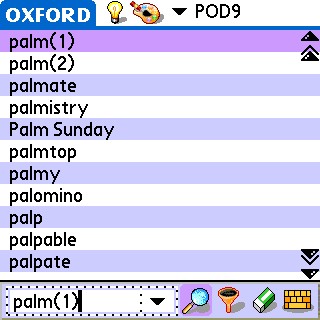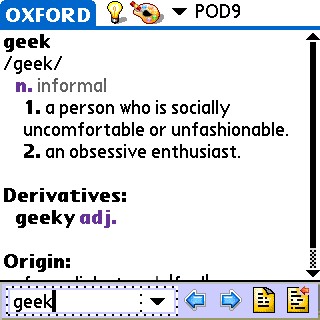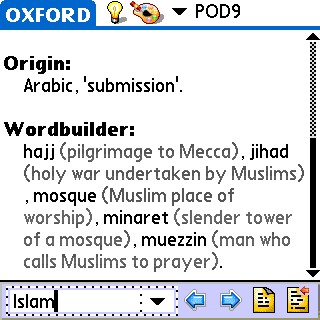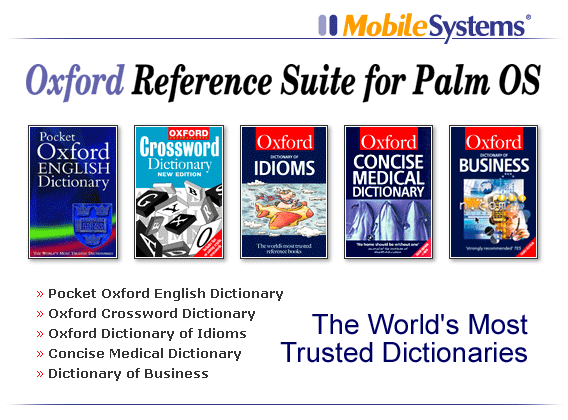
Mobile Systems' Pocket Oxford English Dictionary 4.10
In the heirarchy of English dictionaries, the Oxford University Press offerings
occupy the upper rung of the ladder. Mobile Systems
has ported a collection of these tomes to the PDA format. Although I chose MS Dict English Pro Bundle over its
competitors here, I wanted to retain this more
detailed earlier review. Come along with me for the ride--I'll drive!

The new dictionaries also brought some updates to the core MS Dict viewer. The updated viewer recognizes the new
Oxford offerings, whereas the 3.x version does not. The attractive and functional interface hasn't changed, and
that's good. The forward and back buttons on the definition screen used to move through the dictionary list, but
now move through the word history, which makes more sense. The history list clears when the user exits the viewer.
Dictionary management improved with the addition of "Delete Dictionary", making it easier to remove unwanted
databases both from the MS Dict list and your handheld. Support for the Tungsten navigator and Sony jog dial improved
as well. It retains the excellent progressive search which really helps my spelling, as well as wildcard searches
if you're totally lost. The color use provides both an attractive interface and enhances usability. It provides
support for Sony and Palm hi res displays.
The MS Dict viewer makes excellent use of OS 5 enhancements. High density icons enhance all the displays, and activation
from within other programs (popup) works in OS 5 without MS Dict Hack, which OS 4 requires. MS Dict detects the
underlying OS, so requires no user intervention or separate executables. Please refer to my earlier review for
a more complete treatment of the viewer. In accordance with Mobile Systems' standard policy, upgrade is free for
registered users.
Before I get into the details of the dictionary itself, I need to say a few words on dictionary databases. With
few exceptions, most dictionaries for Palm OS use the Princeton WordNet
databases, usually version 1.6 but a few updated to 1.7.1. In my earlier dictionary review, I discussed the pros
and cons of the WordNet database, but at the bottom line it wasn't designed to be a dictionary. Some, like Beiks,
have done a good job with it by modifying it, but it's a bit difficult to make a gazelle into a giraffe. Some companies
claim huge headword counts, but don't tell you that a large number of the words consist of obscure plants and animals.
Mobile Systems Explanation Pro Dictionary used a real (and excellent) dictionary database. I still think that dictionary
stands as one of the best on the market.

The Pocket Oxford English Dictionary has historically been a standard for others to emulate for balancing compactness
with rich content. This Palm OS implementation carries on that distinguished tradition. With 140,000 headwords
and phrases, it sits at the top of the heap for coverage of real words that you might encounter in your reading
or writing. Despite the large coverage, the database weighs in at about 2.5MB and the viewer provides snappy searches
from a memory card.
With Oxford, the definitions themselves don't tell the whole story. This implementation divides the definition
page into sections: definition, pronunciation guide, alternate spellings, phrases that might include it, derivatives
of the word (different endings/tenses/forms), the etymological origin, a word builder section of related background,
and a usage section. Of course, not every word has or needs all those sections. The definitions tend to be concise
and cover modern nuances. For example, "rat" is not only a rodent, but also an unpleasant person, and
the can be used as a verb for being informed upon or breaking an agreement. Current words and concepts like Balkanize,
read-write, and real-time appear, along with ever-popular ones like caboodle. The phrase section contains common
constructions, like "read between the lines" and "well read" under "read". The derivatives
especially provide great aid and comfort for marginal spellers, such as Balkanization under Bulkanize.

I'm a huge fan of etymology. The origin of a word can often tell as much about it as its straight definition. For
example, "bacteria" comes from the Greek for "little rod", telling me that most bacteria must
be so shaped. Some readers here on the web may be interested to know that "geek" derives from the "geck"
for "fool." Probably more than you wanted to know. The word builder section can almost be a mini-encyclopedia
in some cases. Under "Islam", the word builder contains a number of terms related to that religion that
you might see in an article that contains the word "Islam", including mosque and jihad. The usage section
provides enlightening examples of use in real sentences.
I did look at other dictionaries while preparing this review. In particular, HLCSoft's PocketLingo
Pro, which is based on the American Heritage Dictionary. Although boasting 130,000 headwords, I found many
that were proper names of people. That seemed analagous to the WordNet reliance on obscure plants. Unfortunately,
the database proved difficult to evaluate thoroughly, as the trial version is limited to the letters A-E if I remember
correctly. My personal policy requires avoiding crippled demoware, so since I couldn't evaluate it properly, I
simply moved on.
The MS Dict viewer carries a few minor issues. First, neither the hack nor the OS 5 popup support work in WordSmith.
WordSmith always presents a challenge because it doesn't use standard Palm OS text tables. Still, other companies
have surmounted this obstacle. Both work fine outside of WordSmith. Second, the viewer lacks support for small
fonts on Palm's hi res display, although Sony hi res is supported. Although unlike Sony, Palm does not provide
that support in the OS, there exists at least one library to provide that support. The small fonts could also be
built into the viewer.
If you're getting the idea that this dictionary sets the standard for the genre, you are right on target. The Pocket Oxford English Dictionary provides reliable
and profitable service for the novice and professional alike. It sells for $29.95 with the viewer and dictionary
together, and can be tested through a full-featured trial period of 15 days. Mobile Systems also offers other Oxford
University Press works like the Idiom, Medical, Business, and Crossword Puzzle Dictionaries, as well as Oxford
Italian and Spanish Dictionaries. They offer the four aforementioned specialty dictionaries along with the English
dictionary as a bundle
for just $69.96.

I'm extremely pleased with the new Pocket Oxford English Dictionary, and believe that anyone looking for a high-quality
dictionary under Palm OS need look no further.
Overall Rating: 9/10 (Slight ding for lacking WordSmith support)